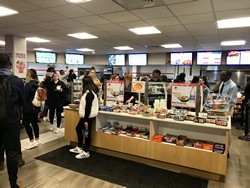As college students realize the influence that their diet has on their bodies, the environment, and animals, it is no surprise that vegan diets were predicted as the largest food trend of 2018.
Vegans consume an abundance of healthful foods such as vegetables, fruits, rice, and legumes. However, they eat the same foods that non-vegans eat: burgers, burritos, pastas, soups, and sandwiches, just vegan versions.
There are even a multitude of vegan ice cream brands sold in local grocery stores. Ben and Jerry’s created seven flavors, including classics Chunky Monkey and Cherry Garcia.
Research firm, GlobalData, reported a 600 percent increase in the number of vegans in the United States over the last three years. Monmouth’s Gourmet Dining, aware of the rising demand for vegan dishes, has implemented a plethora of new options.
Those who follow a vegan diet discover many benefits that plant-based foods have on their health.
“Vegan plant-based options are healthy additions for anyone’s diet. Eating more plants should be a health focus on college campuses,” said Mary Harris, a specialist professor of communication and Director of Plants for Peace, a vegan organization.
The Centers for Disease Control and Prevention reports heart disease as the leading cause of death in the United States.
Caldwell B. Esselstyn Jr., M.D., from the Cleveland Clinic Foundation writes in the article, “Resolving the Coronary Artery Disease Epidemic through Plant-Based Nutrition,” that various types of studies support the effectiveness of a plant-based diet to prevent and reverse heart disease.
Megan Conchar, a senior psychology student states, “It is clear from the data that diet affects heart health. Thus, those who are informed about the causal relationship between food and health are more likely to choose heart-healthy, plant-based diets. Unfortunately, many people are not aware of the data on this topic, and thus do not find reason to change the way they eat.”
New York Times’ recent article, “Major Climate Report Describes Strong Risk of Crisis as Early as 2040,” has shaken readers. According to the article, a report issued by the Intergovernmental Panel on Climate Change describes a not too distant future of worsening food shortages, increasing poverty rates, wildfires, and mortality of coral reefs.
The report notes that globally, reductions in demand for energy, land and greenhouse gases-intensive consumption goods, and agricultural emissions are needed to prevent further climate change.
Raising animals for food requires extraordinary amounts of water, land, and energy—the livestock industry creates more carbon emissions than all cars, planes, and trucks in the world combined. Therefore, adopting a plant-based diet can drastically reduce deterioration and exhaustion of Earth’s natural resources.
 Next time you’re about to eat a hamburger, remember that it takes almost 2,000 gallons of water to produce one pound of meat, (approximately six months of showering!) according to the Huffington Post article, “This Is How Much Water It Takes To Make Your Favorite Food.” Maybe it’s time to consider a veggie burger instead.
Next time you’re about to eat a hamburger, remember that it takes almost 2,000 gallons of water to produce one pound of meat, (approximately six months of showering!) according to the Huffington Post article, “This Is How Much Water It Takes To Make Your Favorite Food.” Maybe it’s time to consider a veggie burger instead.
More was learned about what campuses want in regards to food offerings, thanks to a grant from the United States Department of Agriculture that the University of Tennessee’s Health and Physical Education department secured.
As part of the grant, they distributed a survey to students and employees that aimed to assess behaviors, perceptions, and programs regarding environment and health. They developed an initiative to increase fruit and vegetable intakes, raise physical activity levels, and lower stress.
Out of a maximum 60 points, the food environment of the dining hall was ranked 43 points in terms of healthfulness of foods available. Furthermore, the first priority of employees and fifth priority of students was to increase the number of healthy food options within campus dining halls.
These results indicate a strong desire of the campus community for healthier food options. This can be answered by implementing an expansion of nutritious, plant-based foods on campus.
Aimee Orndorff, RD, campus dietician, made it her goal to focus on integrating plentiful vegan options. “One of the first menu items I wanted to introduce the dining hall to was vegan pizza and therefore, created ‘Vegan Pizza Friday’s,’” Orndorff said.
While the dining hall is home to vegan choices including a salad bar, global and vegan section, veggie burgers, and plant-based milks, Orndorff explained, “Each year, I speak with more and more prospective students who follow a vegan lifestyle and are specifically looking for colleges that have vegan menu items on a daily basis.”
Therefore, Orndorff aims to bring more variety to the dining hall’s global and vegan station. Hello vegan mac’n cheese and make-your-own quinoa bowls!
She also wants to ensure that vegan dessert is offered, as well as tempeh for students to make their own vegan creation at the Hot Plate section. In the campus diner, Gourmet Dining hosts “take-overs” that incorporate vegan options into their menu.
During a past take-over, vegan “sliders,” quinoa lentil with red pepper hummus and black bean with avocado, were served. You can expect to see another take-over happen in the near future.
There are many misconceptions that scare people away from vegan dishes. Orndorff expressed her concerns and said, “There tends to be a lot of misconceptions about veganism, especially about it being bland, boring and all about tofu. These misconceptions couldn’t be further from the truth.
You don’t have to be vegan to try some of our vegan dishes so before passing judgement on our vegan menu items, I encourage you to try them – I bet you will find it tasty.”
While vegans do consume salads and tofu, they also eat an array of delicious foods. Shannon Harris, a junior marine and environmental biology and policy student said, “The biggest concern of non-vegans is that if they switch to a plant based diet they will not have enough protein or enough energy.”
“These people have simply not been presented the proper information and have been misled by the animal agriculture industry and the culture they grew up in,” Harris continued.
“What people do not understand is that we do not need as much protein as we have convinced ourselves of, and that if it was a concern there are so many vegan protein sources,” Harris added.
According to USDA Dietary Reference Intakes, most people need about 0.4 grams of protein per pound of body weight. Therefore, someone who weighs 150 pounds requires about 60 grams daily.
There are 21 grams of protein in one cup of cooked beans alone. A Chipotle burrito containing sofritas, brown rice, beans, veggies, and guacamole contains 31 grams.
There are also a tremendous amount of vegan athletes who exemplify that the body can receive all of the necessary nutrients while maintaining a vegan diet. Your strength is not determined by your meat-intake.
Orndorff encourages questions, comments, or concerns that may be had concerning vegan options on campus. If this article has sparked your interest in vegan foods, give the dining hall’s vegan pizza and other new options a try.
For additional insight concerning the impact of vegan foods on human health, the environment, and the lives of animals, attend a meeting, public talk, or vegan potluck hosted on campus by non-profit organization, Plants for Peace. You’ll get the opportunity to interact with experienced vegans while enjoying delicious, cruelty-free food.
PHOTOS TAKEN by Jenna Puglisi




